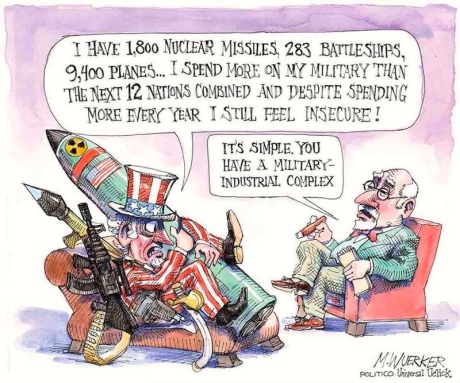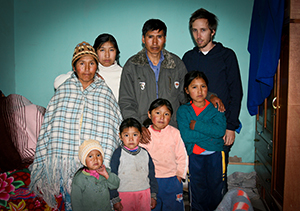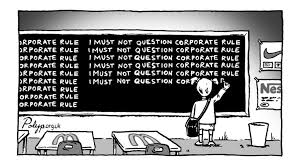“The ruling circles of the imperial superpower set out to destabilize and call into disrepute the government of the home country.”
Robert Mueller, the former head of the national political police (FBI), has indicted 13 Russian nationals for the crime of sowing “discord in the U.S. political system” and encouraging “U.S. minority groups not to vote in the 2016 U.S. presidential election or to vote for a third-party U.S. presidential candidate.” The defendants’ nationality makes their acts of political speech a crime, in Mueller’s legal view, but “at least 20 Americans” are embedded in the document as unindicted co-conspirators “ because they interacted in various ways with the Russian team’s activities during the 2016 presidential campaign.
These U.S. citizens “were just engaging in politics,” said independent journalist Marcy Wheeler, on Democracy Now! “They were putting together campaign events. They were engaging in online speech. That’s like, you know, the most sacred part of being an American citizen. And yet, they were unknowingly interacting with Russians….”
The Russians will never face trial in the U.S., and it is highly unlikely that the unindicted Americans will be criminally charged — but that is not the purpose of Mueller’s indictment. The political crime has been defined, for the broad purpose of repressing dissent in the United States. The witch hunt has found a legalistic vocabulary.
The New York Times’ in-house witch-hunting Negro, Charles Blow , has worked his mojo to the bone, fulminating against the dark forces that refused to support Hillary Clinton’ return to the White House. Mueller’s indictment is the charm Blow has been seeking to remove the hex of resistance to the established duopoly. Blow quotes Mueller’s document: “On or about October 16, 2016, Defendants and their co-conspirators used the Instagram account ‘Woke Blacks’ to post the following message: ‘Particular hype and hatred for Trump is misleading the people and forcing Blacks to vote Killary. We cannot resort to the lesser of two devils. Then we’d surely be better off without voting AT ALL.’”
“The political crime has been defined, for the broad purpose of repressing dissent in the United States.”
These are the Russians’ words, but the sentiment is not at all alien to the contemporary and historical Black political conversation. Yet, for Blow, it is heresy and devilment to urge Black people to vote for third parties, or to refrain from voting. There ought’a be a law against it! — or some string of words that can be made to sound like a law. “What happened in this election wasn’t just a political crime, it was specifically a racialized crime, and the black vote was a central target,” wrote Blow.
Blacks that refuse to forgive the Clintons for mass incarcerating and dehumanizing our people are guilty of Black voter suppression and deemed dupes of both Trump and the Kremlin. To prove that anti-Clinton Blacks are in league with foreign and domestic devils, Blow quotes a Trump operative who bragged that the Republican campaign reminded Black voters about Hillary Clinton’s “suggestion that some African-American males are ‘super predators,’” in order to discourage them from voting. Mueller’s legal framework requires that we forgive such trivial history as mass Black incarceration.
Black Bernie Sanders activists are co-conspirators, in Blow’s view: “Even after Clinton accepted the Democratic nomination, rapper Killer Mike, a prominent Bernie Sanders supporter and surrogate, was still promoting the position that ‘If you’re voting for Trump or Hillary Clinton, you’re voting for the same thing.’”
Which is true, in that both are corporate capitalist politicians and warmongering racists that don’t deserve the vote of any decent person. But, saying so can now be construed as giving “aid and comfort” to a foreign “enemy” – either directly to Putin or to his “surrogate,” Trump. It must be a crime, because “the Russians” were indicted for it, right? Mueller’s “law” spells it out: “In or around the latter half of 2016, Defendants and their co-conspirators, through their personas, began to encourage U.S. minority groups not to vote in the 2016 U.S. presidential election or to vote for a third-party U.S. presidential candidate.”
“Blacks that refuse to forgive the Clintons for mass incarcerating and dehumanizing our people are guilty of Black voter suppression and deemed dupes of both Trump and the Kremlin.”
Funny thing, though: the Democrats refused to cite the Republicans’ systematic, mass suppression of Black voters through the Cross Check scheme which, as Margaret Kimberley points out in this week’s Freedom Rider, caused 400,000 heavily Black votes to disappear in Michigan. Green Party presidential candidate Jill Stein called for a recount in Michigan, Wisconsin and Pennsylvania, and found that Black voter suppression was a major factor, particularly in Detroit. “We are seeing again this evidence in Michigan that communities of color are systematically disenfranchised through the machinery that constitutes really another form of electoral Jim Crow,” Stein told The Guardian . “It’s pretty staggering. Eighty-seven optical scanners [in Detroit] broke on election day.”
The Democratic Party reluctantly added its name to the recount petition, while at the same time claiming it had seen no “actionable evidence ” of grounds for challenging Trump’s victory. But that’s par for the course. The Democrats have never confronted the GOP’s blatant theft of elections through massive suppression of Black votes. They are bound, apparently, by a gentleman’s agreement among the two parties. John Lewis, the Black congressman from Atlanta who wears his voting rights credentials like a robe of glory, abides by that agreement. The first thing out of Lewis’ mouth after Trump was declared the winner, in November, was a denunciation of “the Russians” – but not Black voter suppression by Republicans.
“The Democrats have never confronted the GOP’s blatant theft of elections through massive suppression of Black votes.”
Roughly one year later, Jill Stein — who fought Black voter suppression harder than the Democrats — was targeted for investigation by the Senate Intelligence Committee as a possible collaborator with the Russians .
The suppression of the franchise of their Black base is not considered “treason” or any kind of “high crime” by the Democratic Party, but the siphoning of Black votes away from the corporate duopoly, through voluntary non-voting or support of third parties, is cause to bring out the pitchforks.
Under the Mueller legal formula, there are many more potential co-conspirators. The highest political crimes are “sowing discord” and “spreading distrust towards the candidates and the political system in general” – for which one can theoretically go to prison, if you are a foreigner (Russian, not Israeli), or become an unindicted party to the charge, if American.
The Republicans, of course, have been sowing racial discord as a matter of policy ever since they adopted their “Southern Strategy” in 1968, and it’s been key to their success ever since. The United States is the nation that invented apartheid, and has served as a model for racists around the world. Racial discord is part of its DNA, and is the principal reason for the historical lack of a social contract and the weakness of the Left in this country. Corporate political hegemony would not exist in the U.S., were it not for the endemic nature of white supremacy in this society. The Russians have nothing to do with it — especially the Russian amateurs from St. Petersburg.
“The suppression of the franchise of their Black base is not considered ‘treason’ or any kind of ‘high crime’ by the Democratic Party.”
The cabal has flipped the factual script. It was the Democrats and their allies in corporate media and the national security state that devised a calculated campaign to sow “discord” and “distrust towards the political system in general,” such as not seen in living memory. The initial goal was to depose or discipline the unpredictable, racist billionaire who in 2016 crushed the establishment leaders of the Republican Party — potentially destabilizing the duopoly system of corporate governance — rhetorically rejected the dogma of “free trade,” and spoke as if he would not maintain the momentum of his predecessor’s global military offensive. With the “intelligence community” on point, the political offensive could not help but take on the characteristics of a profoundly destabilizing regime change and psychological operations mission.
In other words, the ruling circles of the imperial superpower set out to destabilize and call into disrepute the sitting government of the home country. They have inflicted great trauma and anxiety among the public in the process, but thanks to the corporate media component of the cabal, most of the blame has accrued to the targets of the campaign: Trump, “the Russians” and those defamed as “dupes” and “co-conspirators” with the fictitious Putin-Trump axis.
It is quite evident that this campaign of self-inflicted chaos is a project of the global corporate class, manifesting elsewhere in the “West” in remarkably similar fashion, but with local characteristics. Russia is, thus, charged with attempting to subvert governments around the world through minions like the St. Petersburg outfit. Through their servants in the Democratic Party, the corporate media, and the intelligence agencies, multinational capital has used Trump’s election to inflict a kind of shock treatment on their domestic polities — a very dangerous gambit, especially in the United States, with its weak social contract and immense capacity for civil violence.
“With the ‘intelligence community’ on point, the political offensive could not help but take on the characteristics of a profoundly destabilizing regime change and psychological operations campaign.”
More dangerous, is the whipping up of war fever based on Russia’s non-existent aggressions (Ukraine, Syria) and fabricated ambitions (the demise of the “West”).
We can be confident in blaming this politically engineered horror on the dominate elements of the U.S. capitalist ruling class, since they could surely call the project to a halt if it were merely a “rogue” enterprise mounted by a small section of their class-mates. Capital is using Russiagate to inflict extreme shocks to the very political system they claim to be defending. The trauma is necessary, they believe, because capital has nothing to offer to the masses of people, and must therefore dramatically weaken or destroy the political mechanisms through which the people make demands on the rulers. They are preparing the landscape for a regime of permanent austerity and war, and plan to suppress all opposition on the Left. That’s why Black Agenda Report and a dozen other Left web sites were named and defamed as Russian fellow travelers and purveyors of “fake news” by the Washington Post, the plaything of the CIA-partnered oligarch, Jeff Bezos.
A lot has happened in the space of a little over a year. Based on Russiagate-era interpretations of “law” and civil propriety, free speech is in the political eye of the corporate owners of media. The shrinking of the digital world that is accessible to the Left is well underway, with no workable alternatives in sight.
The Russiagate express keeps on rolling, despite the fact there is still no evidence for the original contention, that “the Russians” and Vladimir Putin conspired to steal and reveal the emails of the Democratic National Committee, Hillary Clinton and John Podesta. Rod Rosenstein, the Deputy Attorney General, emphasized that there is no evidence that any actual votes were altered or tampered with in the 2016 presidential election. No matter. The Democrats keep imagining other “Pearl Harbors” worthy of going to war over, because their project is to harden the political system for endless war and austerity.
BAR executive editor Glen Ford can be contacted at Glen.Ford@BlackAgendaReport.com .




 Gary Oldman as Winston Churchill in Darkest Hour. In his Oscar acceptance speech for playing the role, Oldman said, “I would just like to salute Sir Winston Churchill.” He might as well have danced on 3 million dead bodies, writes Shree Paradkar.
Gary Oldman as Winston Churchill in Darkest Hour. In his Oscar acceptance speech for playing the role, Oldman said, “I would just like to salute Sir Winston Churchill.” He might as well have danced on 3 million dead bodies, writes Shree Paradkar. 






Open Letter by Over 70 Scholars and Experts Condemns US-Backed Coup Attempt in Venezuela January 25, 2019
Posted by rogerhollander in Imperialism, Latin America, Uncategorized, Venezuela.Tags: juan guaido, Luis Almagro, nicolas maduro, Noam Chomsky, oas venezuela, pompeo, regime change, roger hollander, Venezuela, venezuela coup
add a comment
“For the sake of the Venezuelan people, the region, and for the principle of national sovereignty, these international actors should instead support negotiations between the Venezuelan government and its opponents.”
“The U.S. and its allies must cease encouraging violence by pushing for violent, extralegal regime change.”
—Open Letter
“Actions by the Trump administration and its allies in the hemisphere are almost certain to make the situation in Venezuela worse, leading to unnecessary human suffering, violence, and instability,” the letter reads. “The U.S. and its allies must cease encouraging violence by pushing for violent, extralegal regime change. If the Trump administration and its allies continue to pursue their reckless course in Venezuela, the most likely result will be bloodshed, chaos, and instability.”
Highlighting the harm American sanctions have inflicted upon the Venezuelan economy and people, the letter goes on to denounce the White House’s “aggressive” actions and rhetoric against Venezuela’s government, arguing that peaceful talks are the only way forward.
“In such situations, the only solution is a negotiated settlement, as has happened in the past in Latin American countries when politically polarized societies were unable to resolve their differences through elections,” the letter reads. “For the sake of the Venezuelan people, the region, and for the principle of national sovereignty, these international actors should instead support negotiations between the Venezuelan government and its opponents that will allow the country to finally emerge from its political and economic crisis.”
Read the full letter below: